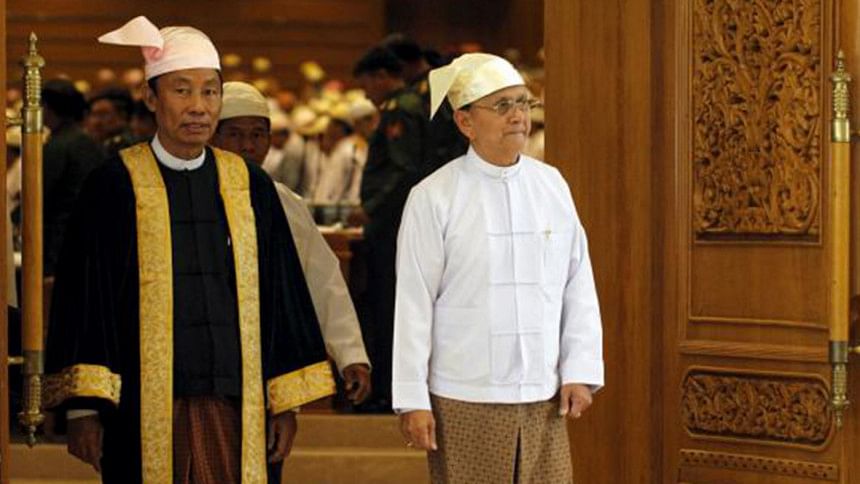Myanmar ruling party chief sacked (video)
Myanmar's powerful ruling party chief Shwe Mann has been ousted from his post, party members said on Thursday, apparently after losing a power struggle with President Thein Sein three months before a general election.
The struggle between the two old rivals became public in a dramatic way late on Wednesday evening, when security forces surrounded the vast headquarters of the ruling Union Solidarity and Development Party (USDP) in the capital, Naypyitaw.
Shwe Mann's ouster from the party follows rare discord within the establishment over the role of the military, which handed power to a semi-civilian government in 2011 but retains an effective veto over the political system.
Shwe Mann had built ties with Nobel laureate and opposition leader Aung San Suu Kyi, who has called repeatedly for the military to withdraw from politics, and he angered the military by supporting an attempt in parliament in June to amend the constitution to limit the military's political role.
It is unclear what the changes mean for the reform agenda in Myanmar, but the heavy-handed involvement of the security forces smacks of the junta-era approach to resolving political disputes.
"It's an unwanted and extreme step to do this," said Khin Zaw Win, Director of the Tampadipa Institute, a policy advocacy group, and advisor to multiple MPs.
"They are using security apparatus to affect a reshuffle in the party. They should have settled this some other way rather than using brute force. This is a reminder of the very unhappy past."
In a brief statement on Thursday, the USDP said that Shwe Mann was replaced as chairman of the party because he was busy in his role as speaker of parliament.
The statement made no reference to the role of security forces in overnight events.
Shwe Mann has been replaced as party chairman by the Htay Oo, the statement said. Htay Oo is an ally of the president.
One of president's closest aides, Tin Naing Thein, has become the new secretary general of the party. He replaced one of Shwe Mann's supporters, Maung Maung Thein.
Other Shwe Mann allies at the top level of the party have also been dropped, according to a new list of central executive committee (CEC) members issued by the USDP on Thursday.
Shwe Mann would remain a member of the party and would contest the election in his own constituency, Than Tun, the head of the CEC, told journalists on Thursday.
For his part, Thein Sein spearheaded reforms after taking power in 2011 that initially surprised the world with their speed and breadth. But reforms have stalled as the election has come into focus.

Both Thein Sein and Shwe Mann have suggested they would accept the job of president after the Nov. 8 parliamentary election.
Tension has risen between the two former top military officers over the selection of candidates for the November election, party sources said earlier.
On Wednesday, the USDP selected only 59 of 159 senior officers who retired from the military to run as candidates for the party in the coming election, the party sources said.
It is unclear why the party selected only a third of the officers, but the decision likely angered officers and politicians keen to preserve the military's sway.
The USDP is comprised largely of former military officers and was created from a social movement set up by the former junta.
Late on Wednesday, several trucks of soldiers and police officers arrived at the party's headquarters.
After the security forces took control of the compound, Htay Oo and another of the president's supporters, Soe Tha, led a late-night meeting of senior party officials that lasted into the early hours of Thursday, party members said.
Shwe Mann and high-ranking party members considered to belong to his faction in the USDP were not present at the meeting, the sources said.
The security forces left after the meeting concluded at around 2.30 a.m., sources said.
Meetings at the USDP resumed on Thursday morning and continued through the day, but there was no sign on Thursday of an additional security presence at the enormous walled and fenced neo-classical building that houses the USDP in the capital.
A USDP official on Thursday said the security forces had been deployed overnight as a "precaution" given the presence of members of parliament.
Shwe Mann was a presidential hopeful when the military handed over power after 49 years of rule in 2011. He had reached a higher rank in the military than his rival Thein Sein, who became president.
The party is expected to fare poorly against Suu Kyi's National League for Democracy in the election.
The constitution reserves 25 percent of seats in parliament for unelected military officers. Changes to the constitution require the support of at least 75 percent of lawmakers, giving the military an effective veto over changes.
An amendment that would have seen the threshold of support lowered to 70 percent failed, as expected, to gain enough support with lawmakers in a June vote. The military has resisted efforts to introduce constitutional amendments to loosen its grip.

 For all latest news, follow The Daily Star's Google News channel.
For all latest news, follow The Daily Star's Google News channel. 



Comments